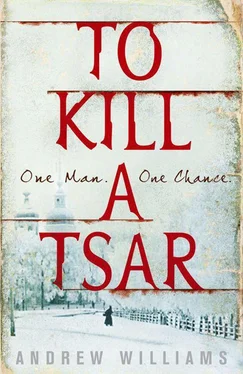He was relieved to leave the noise and darkness and smoke behind and step into the cold air once more. Opposite the tavern was the vintner’s where Dobson bought most of his wine. With a little time to spare, Hadfield visited the shop and was tempted by the silver-tongued sommelier into spending a preposterous sum on a bottle of vintage champagne. ‘To celebrate,’ he would tell Anna, although he knew she would frown and complain of the waste. How strange, he thought, I don’t even know her birthday. The merchant below the vintner was taking delivery of new stock from a covered wagon, staggering under its weight as he felt his way down the slippery steps to his basement shop. It was parked too close to the vintner’s door, the horse stamping and snorting restlessly in the shafts, and Hadfield was obliged to squeeze round to the back of the wagon. The merchant had returned for more and was trying — to the amusement of the old carter — to lift three heavy truckles of cheese at once.
‘Hey — give me a hand there,’ he grumbled.
But the carter laughed and shook his head: ‘Get on with it, can’t you see this gentleman is trying to pass?’
The merchant edged towards the basement steps again, but slipped, and the topmost cheese crashed to the pavement.
‘Are you going to try and flog that now?’ the carter observed with a sneer. ‘I’ll give you ten kopeks for it.’
The merchant glared at him and slid the remaining truckles back on to the cart.
‘Well?’ the old man asked. ‘What about it?’
‘Get lost. It wouldn’t have happened if you’d lent a hand.’
Hadfield studied the cack-handed merchant carefully as he scooped ragged chunks of the broken cheese from the snow. The aroma was ripe and strong. Almost everything in his life reminded him of Anna in one way or another, but he could have sworn there had been a hint of it on her coat at the hospital.
The first time Barclay’s agents noticed the man glancing up at the apartment they dismissed it as of no importance. Tavricheskaya was a busy thoroughfare in the evening, with many well-to-do merchants and professional people living in the new mansion blocks that were springing up in the district. The drawing-room lights were burning invitingly, a parasol in the window, and anyone wishing to visit Alexander Mikhailov would assume it was safe to do so. But the man in the official-looking coat sipped at the apartment like a secret drinker, careful not to break his stride for even a second.
Ten agents from Moscow had moved into Mikhailov’s apartment, and another on the floor above, two days after his arrest. Their presence was known only to a few, their orders simple: watch, wait, listen and arrest anyone — Major Barclay had placed particular emphasis on that — anyone who called at Number 15/8. Only Mikhailov knew the informer’s identity for sure, and he was keeping his mouth firmly shut.
‘He won’t be coaxed or bullied into an indiscretion — he’s too clever,’ Collegiate Councillor Dobrshinsky had observed after the first interrogation, ‘he’s no Goldenberg.’ They had no choice but to wait for the Director to break cover.
The dvornik knew to keep his mouth shut and stay away, and in the week they had been there only a maid and a shoeshine had knocked at the door. So there was a flurry of excitement in the two apartments when the man in the service coat returned the following evening and lingered against the railings of the gardens opposite. Tall but stooped, slightly built, he was wearing a fur hat and most of his face was covered by a black scarf.
He bent to fiddle with his laces, glancing up at the apartment as he did so. After a minute he rose, stepped off the pavement into the road, hesitated, then walked quickly away.
‘He’ll be back,’ Agent Marusin observed when Barclay visited him later in the evening. ‘I’d wager he’s your man.’
‘But you couldn’t see his face?’
‘He was careful about that. The only thing…’ Marusin paused, ‘now that I think of it, he was wearing spectacles.’
‘You’re sure of that?’
Yes. Marusin was quite sure. And on reflection he thought the fellow may have needed thicker lenses because he had peered at the apartment then bent very low over his boots, craning forward as some very short-sighted people do.
Barclay stiffened, his mouth set firm and the hard little lines about his eyes narrowed, but he refused to been drawn into speaking his mind.
He returned in the middle of the following day, slipping into the yard through a building in the parallel street and making his way into the mansion block by the tradesman’s entrance. He had disguised himself as a labourer with a peaked cap pulled low over his face.
The apartment had been turned upside down by the Moscow agents, and the drawing-room floor was littered with broken furniture, books and propaganda leaflets. Sweeping more from a chaise longue, Barclay lay back with his eyes closed to wait for dusk, and was asleep in minutes. It was almost nine o’clock when he was woken by angry voices. Marusin and his colleagues were playing Skat for kopeks. One of them had accumulated a tidy sum and to the annoyance of the rest was preparing to leave the game.
‘I didn’t bring you here for this,’ Barclay barked at them, cross with himself too. ‘Shut up and put the cards away.’
The apartment was cold, the agents hungry, and it was plain the spirits of all but the lucky card sharp were low. Marusin reported no sign of their man.
‘All right then, ask the landlady for food and send the dvornik up to light the fire.’ Barclay picked up his coat in readiness to leave. ‘I don’t think you’ll see our man now, but keep the noise down. Clear?’
The wind buffeted him as he stepped into the dark yard, drops of ice pricking his face, and in the lee of the buildings opposite he paused to adjust his scarf. His modest apartment was only a few streets away in the Smolny district. Mikhailov had been a neighbour. Hands wedged in the pockets of his short coat, he walked on with eyes bent to the icy pavement, his thoughts of home and the sharp words his wife would have for him when she saw him dressed as a common labourer. But he had gone only a few hundred yards when he heard someone shout and, looking back, he saw one of the Moscow agents running down the lane towards him. The wind whipped his words away but the urgency in his voice was clear enough. Barclay stood and waited, his fingers round the butt of the revolver in his coat pocket.
‘We’ve got him, sir,’ the man panted, his head bent over his knees. ‘He arrived as soon as you’d left. Tried to get his gun out but Agent Marusin caught him a good blow.’
Barclay hurried back along the lane and into the mansion block, taking the stairs two at a time. An agent was at the apartment door and he brushed past two more in the corridor.
‘He’s in the bedroom, sir.’ It was Marusin.
‘Has he said anything?’ Barclay asked, struggling to catch his breath.
‘Only that he’s one of ours and we should let him go. He refuses to give us a name.’
Barclay stood in the hall for a minute, breathing deeply, his hand on the door knob. Then, with his face set hard, he turned it and stepped inside.
Agent Nikolai Kletochnikov was sitting on the bed with his back to the wall, a bloody handkerchief clasped to his nose, his broken spectacles on the bedspread beside him. He lifted anxious eyes to Barclay’s face for a second then looked away.
‘I thought it might be you,’ said Barclay, and to his intense annoyance there was a tremor in his voice. ‘You left me for dead in the student Popov’s apartment. I knew you were a coward, now I know you’re worse.’
Kletochnikov looked up at him again, and this time Barclay read defiance and something close to hatred in his face.
Читать дальше












